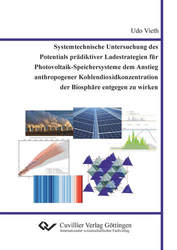| Areas | |
|---|---|
| Serie de libros (97) |
1381
|
| Nachhaltigkeit |
3
|
| Gesundheitswesen |
1
|
| Letra |
2369
|
| Ciencias Naturales |
5408
|
| Ciencias Ingeniería |
1795
|
| Ingeniería | 292 |
| Ingeniería mecánica y de proceso | 862 |
| Ingeniería eléctrica | 688 |
| Mineria y metalurgía | 30 |
| Arquitectura e ingeniería civil | 75 |
| General |
98
|
|
Leitlinien Unfallchirurgie
5. Auflage bestellen |
|
Erweiterte Suche
Systemtechnische Untersuchung des Potentials prädiktiver Ladestrategien für Photovoltaik-Speichersysteme dem Anstieg anthropogener Kohlendioxidkonzentration der Biosphäre entgegen zu wirken (Tienda española)
Udo Vieth (Autor)Previo
Indice, PDF (56 KB)
Lectura de prueba, PDF (560 KB)
Diese Arbeit entwickelt eine neue prognosebasierte Ladestrategie für einen Photovoltaik-Akkumulator, zur Maximierung des Autarkiegrades bei gleichzeitiger Minimierung der Abregelverluste was besonders für Privathaushalte interessant ist. Dazu wird eine energetisch optimierte Konfiguration aus Speicher und PV-Generator erarbeitet. Verglichen wird dies mit einem Smart Home-System, dass primär solare Überschüsse nutzen soll. Dabei wird der Focus auf die tatsächliche Umweltverträglichkeit regenerativer Energien gelegt und vergleicht Anspruch und Wirklichkeit bei CO2-Ausstoßreduzierung.
This thesis develops a new forecast-based charging strategy for an accumulator for photovoltaics, to maximize the autarky level while minimizing the turn-down losses. This is relevant especially for private households. An energy-optimized configuration of storage and PV generator is developed. This is compared with a Smart Home system, which should primary use solar surpluses. The actual environmental sustainability will be focused and compared with the claim and reality in reducing in output of CO2.
| ISBN-13 (Impresion) | 9783736972308 |
| ISBN-13 (E-Book) | 9783736962309 |
| Formato | A5 |
| Idioma | Alemán |
| Numero de paginas | 310 |
| Laminacion de la cubierta | Brillante |
| Edicion | 1. |
| Lugar de publicacion | Göttingen |
| Lugar de la disertacion | Hagen |
| Fecha de publicacion | 07.07.2020 |
| Clasificacion simple | Tesis doctoral |
| Area |
Ingeniería de energía
|
| Palabras claves | CO2-Budget, anthropogener Treibhauseffekt, Klimawandel, CO2-Fußabdruck, Energiewende, Lithium-Ionen-Akkumulator, Energie-Einsparpotentiale, Ökobilanz, Prognosebasierte Ladestrategie, Eigenstromversorgung, Autarkiegrad-Optimierung, Erneuerbare-Energien-Gesetz, Kohleausstieg, Netzparität, CO2 budget, anthropogenic greenhouse effect, climate change, CO2 footprint, Energy turnaround, Lithium-Ion battery, possible energy savings, environmental performance evaluation, Prognosebasierte Ladestrategie, current self-supply, Optimising of autarky rate, Renewable energy sources act, fossil fuel phase-out, grid parity |








